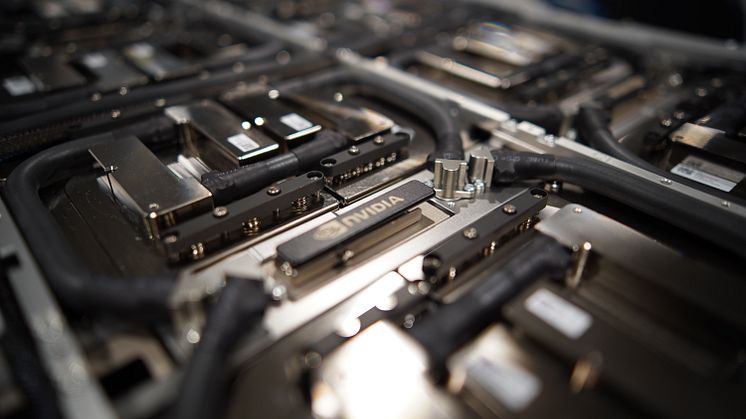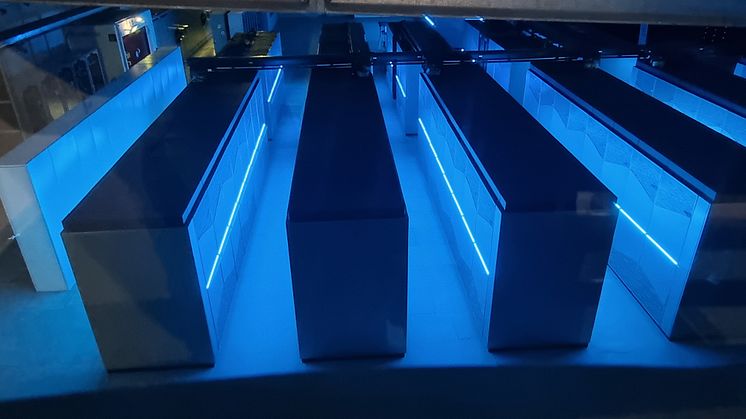
Press release -
New JUPITER module strengthens leading position of Europe’s upcoming Exascale Supercomputer
The journey towards Europe’s first exascale supercomputer, JUPITER, at Forschungszentrum Jülich is progressing at a robust pace. A major milestone has just been reached with the completion of JETI, the second module of this groundbreaking system. By doubling the performance of JUWELS Booster—currently the fastest supercomputer in Germany—JETI now ranks among the world's most powerful supercomputers, as confirmed today at the Supercomputing Conference SC in Atlanta, USA. The JUPITER Exascale Transition Instrument, JETI, is already one-twelfth of the power of the final JUPITER system, setting a new benchmark on the TOP500 list
Built by the Franco-German team ParTec-Eviden, Europe’s first exascale supercomputer, JUPITER, will enable breakthroughs in the use of artificial intelligence (AI) and take scientific simulations and discoveries to a new level. Procured by the European supercomputing initiative EuroHPC Joint Undertaking (EuroHPC JU), it will be operated by the Jülich Supercomputing Centre (JSC), one of three national supercomputing centres within the Gauss Centre for Supercomputing (GCS). Since the middle of this year, JUPITER has been gradually installed at Forschungszentrum Jülich. Currently, the modular high-performance computing facility, known as the Modular Data Centre (MDC), is being delivered to house the supercomputer. The hardware for JUPITER’s booster module will occupy 125 racks, which are currently being pre-installed at Eviden’s flagship factory in Angers, France, and will then be shipped to Jülich ready for operation.
The final JUPITER system will be equipped with approximately 24,000 NVIDIA GH200 Grace Hopper Superchips, specifically optimized for computationally intensive simulations and the training of AI models. This will enable JUPITER to achieve more than 70 ExaFLOP/s in lower-precision 8-bit calculations, making it one of the world’s fastest systems for AI. The current JETI pilot system contains 10 racks, which is exactly 8 percent of the size of the full system. In a trial run using the Linpack Benchmark for the TOP500 list, JETI achieved a performance of 83 petaflops, which is equivalent to 83 million billion operations per second (1,000 PetaFLOP is equal to 1 ExaFLOP). With this performance JETI ranks 18th on the current TOP500 list of the world’s fastest supercomputers, doubling the performance of the current German flagship supercomputer JUWELS Booster, also operated by JSC.
At the same time, JETI is highly energy-efficient, securing a 6th position on the Green500 list of the most energy-efficient supercomputers. This result underscores the high standards set by JUPITER's development system, JEDI, which was launched at Forschungszentrum Jülich in the spring and made it straight to the top of the Green500 list.
JUPITER will become the first supercomputer in Europe capable of performing over more than one ExaFLOP per second, which equates equals to one quintillion – a “1” followed by 18 zeroes – calculations per second at 64-bit double precision. This is comparable to the processing power of one million modern smartphones. As one of the most powerful AI supercomputers in the world, JUPITER is a driver of progress for Germany and Europe that will contribute to securinge technological and digital sovereignty.
Funding:
JUPITER is funded half by the European supercomputing initiative EuroHPC JU and a quarter each by the Federal Ministry of Education and Research (BMBF) and the Ministry of Culture and Science of the State of North Rhine-Westphalia (MKW NRW) via the Gauss Centre for Supercomputing (GCS).
About Forschungszentrum Jülich:
Shaping change: This is what drives us at Forschungszentrum Jülich. As a member of the Helmholtz Association with more than 7,400 employees, we conduct interdisciplinary research into a digitized society, a climate-friendly energy system, and a sustainable economy. We focus on natural, life, and engineering sciences in the fields of information, energy, and bioeconomy. We combine this with specialist expertise in high-performance computing and artificial intelligence using unique scientific infrastructures.
Jülich scientists investigate how information is processed in biological and technical systems. To this end, research at Jülich combines various areas: simulation and data science using high-performance computing (HPC), quantum computing, brain research, neuromorphic computing, and research into bioelectronics-based and nanoelectronics-based information technologies of the future. Thanks to its unique computing infrastructure and professional expertise, Forschungszentrum Jülich makes an important contribution to the application of artificial intelligence. We develop reliable, transparent AI tools and foundation models and our AI expertise are highly sought after in science and industry.
>>> read more
About EuroHPC JU:
The EuroHPC Joint Undertaking (EuroHPC JU) is a legal and funding entity created in 2018 to enable the European Union and EuroHPC JU participating countries to coordinate their efforts and pool their resources with the objective of making Europe a world leader in supercomputing.
In order to equip Europe with a world-leading supercomputing infrastructure, the EuroHPC JU has already procured nine supercomputers, located across Europe. No matter where in Europe they are located, European scientists and users from the public sector and industry can benefit from these EuroHPC supercomputers via the EuroHPC Access Calls to advance science and support the development of a wide range of applications with industrial, scientific and societal relevance for Europe.
Recently reviewed by means of Council Regulation (EU) 2024/1732, the EuroHPC JU received a new mandate to develop and operate AI factories. These comprehensive open AI ecosystems centered around EuroHPC supercomputing facilities will support the growth of a highly competitive and innovative AI ecosystem in Europe.
About Eviden:
Eviden is a next-gen technology leader in data-driven, trusted and sustainable digital transformation with a strong portfolio of patented technologies. With worldwide leading positions in advanced computing, security, AI, cloud and digital platforms, it provides deep expertise for all industries in more than 47 countries. Bringing together 41,000 world-class talents, Eviden expands the possibilities of data and technology across the digital continuum, now and for generations to come. Eviden is an Atos Group company with an annual revenue of c. € 5 billion.
Topics
Categories
About ParTec:
ParTec AG specialises in the development and manufacture of AI supercomputers based on its modular high-performance computing (HPC) systems and quantum computers (QC) as well as the associated system software. The offering also includes consulting and support services in all areas of the development, construction and operation of these modern systems. The concept of dynamic modular system architecture (dMSA) is the result of more than ten years of research and was developed by ParTec as a novel system design for massively parallel high computing systems. The dMSA and the underlying ParaStation Modulo Software Suite, which was developed and is maintained by ParTec, have proven to be particularly suitable for the complex requirements of massive computing power in artificial intelligence.
Further information about the company and ParTec AG's innovative solutions in the field of high-performance computing and quantum computing can be found at www.par-tec.com.




